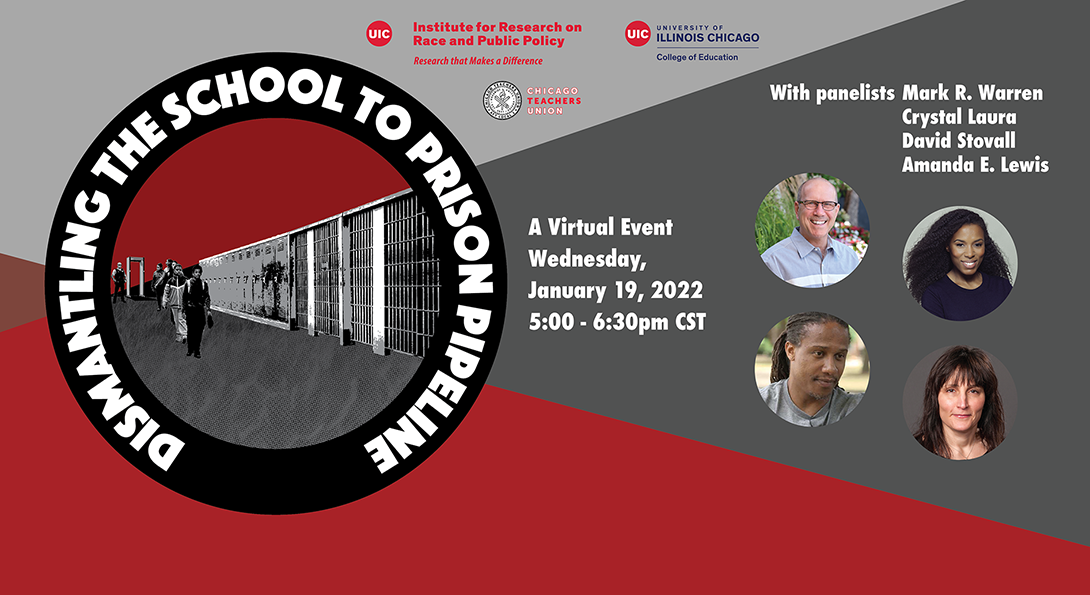Dismantling the School-to-Prison Pipeline

Legacies of Racism Event
About the event: In Willful Defiance: The Movement to Dismantle the School-To-Prison Pipeline, Mark R. Warren documents how Black and Brown parents, students, and low-income communities of color organized to dismantle the school-to-prison pipeline in their local schools and built an intersectional movement that spread across the United States. Join IRRPP and the UIC College of Education for a panel conversation with Mark R. Warren, Crystal Laura, David Stovall, and Amanda E. Lewis about the ways grassroots movements have worked to dismantle punitive disciplinary practices in schools.
Panelists are:
Mark R. Warren, professor of public policy and public affairs at the University of Massachusetts Boston. He is a sociologist and community engaged scholar who studies and works with community, parent and youth organizing groups seeking to promote equity and justice in education, community development and American democratic life. Warren is the author of six books, most recently Willful Defiance: The Movement to Dismantle the School-to-Prison Pipeline (Oxford University Press, 2021). Warren has co-founded several networks promoting activist scholarship, community organizing and education justice, including the People’s Think Tank on Educational Justice, the Urban Research Based Action Network, and the Special Interest Group on Community and Youth Organizing in the American Educational Research Association.
Crystal Laura, assistant professor of educational leadership at Chicago State University, a comprehensive institution on the city’s storied South Side. By day, she explores leadership preparation for learning in the context of social justice with the goal of teaching school administrators to recognize, understand, and address the school-to-prison pipeline. During the second shift, she coparents two marvelous boys who give her work in the field of education particular urgency.
David Stovall, professor in Criminology, Law and Justice & Black studies at UIC. His scholarship investigates three areas 1) Critical Race Theory, 2) the relationship between housing and education, and 3) the intersection of race, place and school. In the attempt to bring theory to action, he works with community organizations and schools to address issues of equity, justice and abolishing the school/prison nexus. His work led him to become a member of the design team for the Greater Lawndale/Little Village School for Social Justice (SOJO), which opened in the Fall of 2005. Furthering his work with communities, students, and teachers, his work manifests itself in his involvement with the Peoples Education Movement, a collection of classroom teachers, community members, students and university professors in Chicago, Los Angeles and the San Francisco Bay Area who engage in collaborative community projects centered in creating relevant curriculum.
Moderator Amanda E. Lewis, director of the Institute for Research on Race and Public Policy and College of Liberal Arts and Sciences distinguished professor of black studies and sociology at UIC. Her research focuses on how race shapes educational opportunities and on how our ideas about race get negotiated in everyday life. She is the author of several award-winning books including, with co-author John Diamond, Despite the Best Intentions: Why racial inequality persists in good schools (Oxford University Press, 2015), and Race in the Schoolyard: Negotiating the color-line in classrooms and communities (Rutgers University Press 2003).
This event is co-sponsored by the UIC College of Education and the Chicago Teachers Union.
About the series: Events in the Legacies of Racism Series deepen our understanding of the challenges and possibilities of policy efforts to address longstanding racial inequality. Legacies of Racism events build on the themes from our State of Racial Justice in Chicago reports and explore the recent and historic origins of racial and ethnic inequities and ask questions about what it means to try to repair systematic harm done to people and communities.